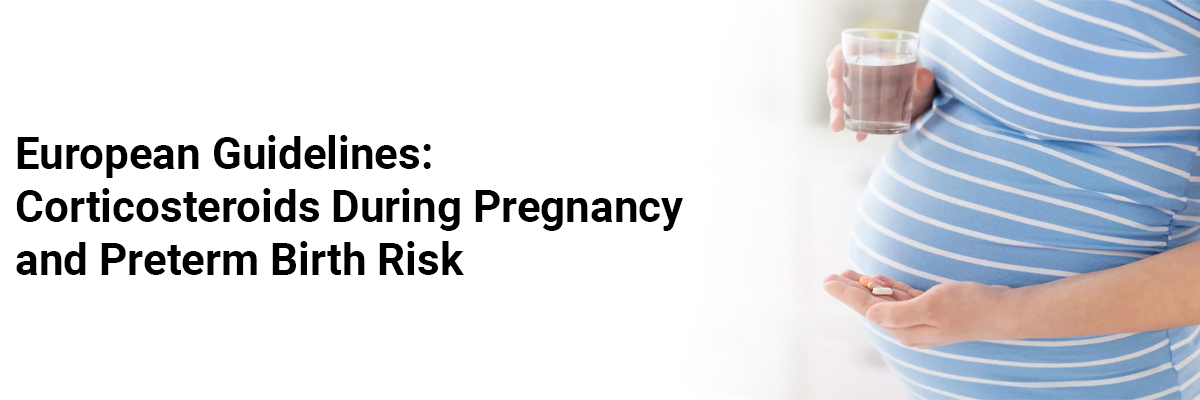
 IJCP Editorial Team
IJCP Editorial Team
European guidelines: corticosteroids during pregnancy and preterm birth risk
European guidelines established several recommendations regarding the administration of corticosteroids for pregnant women:
- Corticosteroids may be given to pregnant women between 24+0 and 33+6 weeks of gestation when preterm birth is expected within the next seven days. This treatment has consistently been shown to reduce neonatal mortality and morbidity (strong recommendation, strong-quality evidence).
- In selected cases, corticosteroid administration may be considered in women of gestation age – up to 34+6 weeks (expert opinion). Infants delivered within 7 days of corticosteroid administration show optimal benefits. Even a single-dose administration should be considered for women at imminent risk of preterm birth, as it can improve neurodevelopmental outcomes (conditional recommendation, moderate-quality evidence).
- Either betamethasone or dexamethasone can be used for corticosteroid administration. Betamethasone can be given as two 12 mg doses i.m., 24 hours apart, while dexamethasone can be administered as either four 6 mg doses i.m., 12 hours apart, or two 12 mg doses i.m., 24 hours apart (strong recommendation, moderate-quality evidence).
- Corticosteroid administration may be considered between 22+0 and 23+6 weeks of gestation for pregnancies anticipated to result in preterm birth within the next seven days in cases where active newborn life support is indicated, based on parental preferences. This treatment has shown clear survival benefits, but its impact on short-term neurological and respiratory function and long-term neurodevelopmental outcomes remains uncertain (weak recommendation, low/moderate-quality evidence).
- Corticosteroid administration between 34+0 and 34+6 weeks should be offered in a few selected cases (expert opinion). Administration between 35+0 and 36+6 weeks should not be undertaken except in prospective randomized trials. Corticosteroids reduce the incidence of transient tachypnea in the newborn; however, they do not affect the incidence of respiratory distress syndrome. Further, corticosteroids increase neonatal hypoglycemia. Long-term safety data are lacking (moderate quality evidence; conditional recommendation).
- Administration of corticosteroids is not recommended for pregnancies beyond 37+0 weeks, including scheduled cesarean deliveries. Current evidence suggests no benefit and the long-term effects remain unknown (conditional recommendation, low-quality evidence).
- In twin pregnancies, corticosteroid administration should be given with the same indications and doses as for single pregnancies. However, existing evidence suggests that it should be reserved for pregnancies at high risk of delivering within a 7-day interval (conditional recommendation, low-quality evidence).
- Maternal diabetes mellitus is not a reason to avoid using antenatal corticosteroids (strong recommendation, moderate-quality evidence).
- In pregnancies with gestation earlier than 34+0 weeks, a single repeat course of corticosteroids may be considered if the previous course was completed more than seven days earlier and there is a renewed risk of imminent delivery (conditional recommendation, low-quality evidence).
Source: Daskalakis G, Pergialiotis V, Domellöf M, et al. J Matern Fetal Neonatal Med. 2023;36(1):2160628. doi:10.1080/14767058.2022.2160628

IJCP Editorial Team
Comprising seasoned professionals and experts from the medical field, the IJCP editorial team is dedicated to delivering timely and accurate content and thriving to provide attention-grabbing information for the readers. What sets them apart are their diverse expertise, spanning academia, research, and clinical practice, and their dedication to upholding the highest standards of quality and integrity. With a wealth of experience and a commitment to excellence, the IJCP editorial team strives to provide valuable perspectives, the latest trends, and in-depth analyses across various medical domains, all in a way that keeps you interested and engaged.






















Please login to comment on this article